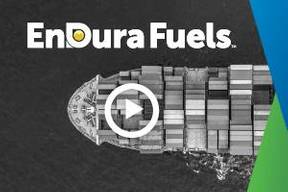Shipbreaking NGOs Attack FPSO North Sea Producer
16 August of last year the FPSO North Sea Producer was beached in Chittagong, Bangladesh. The ship was allowed to leave the UK based on the false promise that it would be further operationally used in the Tin Can port in Nigeria. One year on, the battle to hold the owners and cash buyers accountable for the illegal export of the FPSO is not over. The North Sea Producer (ex Dagmar Maersk) was deployed in the McCulloch field in the North Sea, transporting and extracting oil from the UK continental shelf for 17 years, and was owned by the North Sea Production Company, a single-ship joint venture between the Danish A.P. Moeller Maersk and the Brazilian Odebrecht. Once the field closed, the FPSO North Sea Producer was laid up in Teesport for a year while the owners were looking for buyers.
EALs Rise Up on Deck
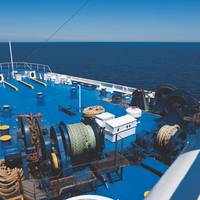
The next critical area of consideration for the use of Environmentally Acceptable Lubricants is on deck. What’s leaking into the water from your cranes and winches? Vessel fleets face an increasing number of environmentally-focused regulations, adding complexity to their operations and creating urgency around compliance. These regulatory requirements, however, do not offset an operator’s need for products that perform consistently well. With the right Environmentally Acceptable Lubricants (EALs)…
Changing Spill Risk in a Changing Arctic Landscape

Industry analyst and environmental consultant Dagmar Schmidt Etkin, PhD, takes a hard look at a rapidly shifting operational landscape in the Arctic. Always an honest broker of information, Etkin tells it like it is. Oil spill risk is present anywhere that oil is present in reservoirs, or is transported, consumed, stored, and handled in some way. The Arctic is no exception. Not only are there oil reserves in the Arctic, some of which are being or will soon be considered for exploration and production, there is also oil being transported as cargo or as fuel to Arctic communities.
Barriers, Drivers & Interaction of Wind Propulsion Technologies
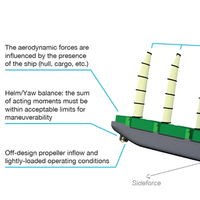
Dagmar Nelissen, Senior researcher and consultant at CE Delft, will present the preliminary findings of the EU DG Clima study ‘Analysis of market potentials and market barriers for wind propulsion technologies for ships’, at next week’s Natural Propulsion Seminar. The study’s general objective is to aid the European Commission in exploring how further support can be provided to ensure that wind propulsion technologies are deployed in the shipping sector. “The CO2 abatement measures…
Women Are Moving up in the Maritime Industry
Historically, women have played only a minor role in shipping, shipbuilding and related areas up to the present, but decision makers in the industry are now beginning to recognize their potential in view of the current shortage of skilled people. Women are a major focus at the Maritime Career Market held at SMM. A highlight is presentation of the “Personality of the Year 2016” award by the Women’s International Shipping & Trading Association (WISTA). More women means more profit, as shown in a study by the Peterson Institute in Washington published in February 2016. The more women a company employs in middle and senior management, the better its earnings. The rule of thumb is that an increase in female executives from zero to 30 percent boosts profitability by 15 percent.
New Risks Moving Crude Oil by Rail
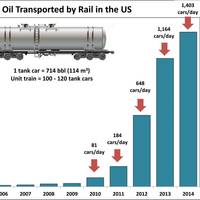
The rapidly changing landscape of crude oil exploration and drilling in the US and Canada, together with economic considerations, logistical issues related to pipeline transport, and the availability of new types of crude oils, including Bakken crude and various forms of bitumen, have resulted in a very sudden and dramatic increase in the transport of crude oil by railroad. “Unit trains” containing 100 or more tank cars are transporting crude oil through regions that have not previously experienced this type of rail transport, and there are significant concerns about safety.
Marine News Editor's Note
It is at times like this that bumper sticker humor comes in handy. One of my favorites has to be the infamous “God, please let me have another oil boom – I promise not to mess this one up” version that graced the bumpers of pickup trucks on the Gulf Coast in the late 1980’s. I lived through that cataclysmic event during my 14 years in Houston. It was in 1985 that the bottom had dropped out of oil, reaching a nadir of $12 per barrel. Using the time-honored Keefe family tradition of buying high and selling low, I eventually shed a primary residence and a three-unit rental property in the Bayou City during the worst of it. It is okay if you find yourself inclined to ask, “So what?” It’s a good question.
Exporting Crude Oil A “No-Brainer”
As I watch the back and forth in Washington – and beyond – on the issue of whether to allow the export of crude oil and LNG, I can only shake my head and wonder why it is even a topic for discussion anymore. I honestly cannot think of a single reason why we shouldn’t. Our European and Asian readers are probably laughing as I discuss the merits of changing a domestic policy that is clearly a remnant from a bygone era. Here at home, though, it’s not really a laughing matter, is it? For more than four decades, the biggest threat to American security was energy – or rather the lack of enough domestic supplies and the use of energy (by others, principally OPEC) as a geopolitical weapon. Those days, at least for North Americans, are long gone. The shale boom is upon us.
Arctic Spill “Response Gap” Under the Microscope
Make no mistake about it: the Arctic is open for business. The cumulative environmental footprint of oil exploration outfits, merchant shipping, mining, eco-tourism and the cruise ship trades is thus far minor, but the potential for an exponential increase in commerce – especially if the climate trends now affecting the region continue – is seemingly limitless. For the maritime industry, the down side to this is as big as the most promising business opportunity to come along in decades. The utility of a Northern Sea Route that follows the Siberian coastline, producing impressive time and fuel savings, a reduced emissions footprint, and elimination of canal transit fees for shippers moving goods between Europe and Asia has already been proven.
Wrecks of the World II: Evaluating and Addressing Potential Underwater Threats
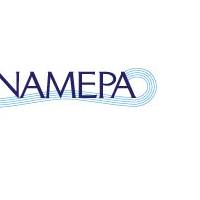
Delegates and speakers from around the globe will converge on the Maritime Institute of Technology and Graduate Studies (MITAGS) in the Washington, DC area Linthicum Heights, MD) US to participate in the second Wrecks of the World conference being held June 6-7, 2011. This is a unique opportunity to meet with global experts to explore potentially polluting wrecks and recent incidents around the world. These wrecks have caused government agencies and responsible parties to look…
Environmental Intelligence in Shipping Seminar
Founding Chairman of NAMEPA (North American Marine Environment Protection Association Clay Maitland unveiled plans to debut NAMEPA’s 2010 Seminar Series in San Francisco on March 9 at the Marines Memorial Club. The title of the seminar is “Environmental Intelligence in Shipping”. The seminar will kick off at 0800 with coffee and registration and end with a luncheon featuring an address by VADM Jody Breckenridge, USCG Commander Pacific Area. “The purpose of NAMEPA’s Seminar Series is to bring together stakeholders in the marine community to discuss concerns and actions that address marine environment protection” stated Mr. Maitland. Kevin Krick, Director of Environmental Affairs Global for APL Ltd. will lead the proceedings with an overview of industry best practices.
Shipwrecks: Cleaning Up from the Past
Marine salvage and subsea industry leaders gathered today on the MITAGS campus in Linthicum Heights, Md., to discuss the environmental, legal, financial and moral ramifications of the discovery and recovery of marine casualties, new and old, around the globe. Dubbed “Wrecks of the World: Hidden Risks of the Deep,” the conference -- which was sponsored by a long list of marine industry organizations including the American Salvage Association, the Marine Technology Society, NAMEPA and the International Salvage Association, among others – focused on a number of critical issues surrounding the discovery and mitigation of potential brewing ecological disasters.
German Marine Equipment Industries: Expansion to Protect World Market Position
German marine equipment suppliers are staying successful. Surveys of their industry association, the VDMA (German Engineering Federation), resulted in new record figures: in 2007, the sales achieved €11.9 billion with now 76,000 employees, making over 13.8% up on the previous year. The export rate was 73%. The sector could thus maintain and expand its world leading role for high tech systems for shipbuilding. 58% of the German suppliers expect the order inflow in home trading still to increase in 2008, pushed by the still extraordinarily high capacity utilization of the German shipyards. But the effects of the global shipbuilding boom can mainly be seen in the foreign markets.
Hearing on Oil Spills from Non-Tank Vessels
On December 18, the Subcommittee on Oceans, Atmosphere, Fisheries & Coast Guard of the Senate Committee on Commerce, Science, and Transportation conducted a hearing on Oil Spills from Non-Tank Vessels. Committee Chairman Daniel Inouye (D-HI) noted the success of OPA 90 in reducing spills from tank vessels, but noted that the incidence of spills from non-tank vessels have not declined as much, asking whether standards for these vessels should be strengthened. Admiral Thad Allen, Commandant, US Coast Guard, discussed efforts to make fuel tanks on vessels less susceptible to damage and proposed increasing the limit of liability for damages caused by oil spills from non-tank vessels. Ms.
A.P. Moller Looks To Resume North Sea Oil Production
Danish oil and shipping conglomerate A.P. Moeller hopes to resume some of its 120,000 bpd North Sea oil production, which was halted 11 days ago due to a gas explosion, the Danish Energy Agency said on Thursday. "There are considerations about resuming some of the production this weekend. We are thinking about it and will meet with Maersk on Friday," an agency spokesman said. The gas explosion occurred on May 20 on the Gorm Field, where production was halted immediately as well as on its four satellite fields Halfdan, Skjold, Rolf and Dagmar. In all, the five fields produced 120,700 bpd in April or 40 percent of Danish Underground Consortium`s (DUC) total production of 302,200 bpd.




